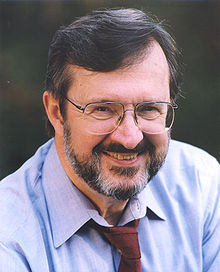- Dave Obey
-
Dave Obey 
Member of the U.S. House of Representatives
from Wisconsin's 7th districtIn office
April 1, 1969 – January 3, 2011Preceded by Melvin Laird Succeeded by Sean Duffy Chairman of the House Committee on Appropriations In office
January 4, 2007 – January 3, 2011Preceded by Jerry Lewis Succeeded by Hal Rogers Member of the
Wisconsin State AssemblyIn office
1963–1969Personal details Born October 3, 1938
Okmulgee, OklahomaPolitical party Democratic Spouse(s) Joan Obey Residence Wausau, Wisconsin Alma mater University of Wisconsin (B.A.) Occupation Realtor Religion Roman Catholic David Ross "Dave" Obey (pronounced /ˈoʊbiː/ oh-bee; born October 3, 1938)[1] is the former U.S. Representative for Wisconsin's 7th congressional district, serving 21 consecutive terms from 1969 until 2011. The district includes much of the northwestern portion of the state, including Wausau and Superior. He is a member of the Democratic Party, and served as Chairman of the powerful House Committee on Appropriations from 1994 to 1995 and again from 2007-2011.
On May 5, 2010, Obey announced that he would not seek reelection to Congress in November 2010. He left Congress in January 2011, and was succeeded by Republican Sean Duffy. He began working for Gephardt Government Affairs, a lobbying firm founded by former U.S. House Majority Leader Dick Gephardt, in June 2011.[2]
Contents
Early life, education and career
Obey was born in Okmulgee, Oklahoma, the son of Mary Jane (née Chellis) and Orville John Obey.[3] Soon after his birth, his family moved back to his parents' native Wisconsin, and Obey was raised in Wausau, Wisconsin, where he has lived since.[3] He graduated from Wausau East High School and received his Bachelor of Arts degree in political science from and did his graduate work in Soviet politics[4] at the University of Wisconsin–Madison. Before serving in Congress, Obey worked as a real estate broker.
Early political career
Obey grew up as a Republican. However, he was so angered after seeing one of his teachers falsely branded a Communist by backers of Joseph McCarthy that he became a Democrat in the mid-1950s, sometime between the ages of 16 and 18.[5]
He was elected to the Wisconsin State Assembly in 1963 and served there until 1969.
U.S. House of Representatives
Tenure
Obey was the longest-serving member of either house of Congress in Wisconsin's history. He was also the third longest-serving member of the House, after fellow Democrats John Dingell and John Conyers, both of Michigan.
In Congress, Obey chaired the commission to write the House's Code of Ethics. Among the reforms he instituted was one requiring members of the House to disclose their personal financial dealings so the public would be made aware of any potential conflicts of interest. Obey served as chairman of the House Appropriations Committee from 2007 to 2011; he briefly chaired this committee from 1994 to 1995 and served as its ranking Democrat from 1995 to 2007. He also chaired its Subcommittee on Labor.
Obey was one of the most liberal members of the House; he considers himself a progressive in the tradition of Robert La Follette.[6] Obey had risen to the position of fifth ranking House Democrat since his party retook control of Congress.
Obey also is remembered for being the congressman who intervened when fellow Democrat Harold Ford, Jr. approached Republican Jean Schmidt on the House floor in 2005. Ford was upset because Schmidt had called Congressman John Murtha a coward for advocating a redeployment of American forces in Iraq.
Obey holds a critical view of the mainstream American news media, as evidenced by his words on June 13, 2008, upon the sudden death of NBC News Washington Bureau Chief Tim Russert. Obey said of Russert: "Tim Russert's death is not just a body blow for NBC News; it is a body blow for the nation and for anyone who cherishes newsmen and women who have remained devoted to reporting hard news in an era increasingly consumed by trivia."[7] Dave Obey announced an end to his congressional career on May 5, 2010, with press releases being released on May 6. ."[8]
Education
On June 30, 2010, Obey proposed an amendment to a supplemental war spending bill that would allocate $10 billion to prevent expected teacher layoffs from school districts nationwide. The amendment, which passed the House on July 1, 2010, proposed siphoning off $500 million from the Race to the Top fund as well as $300 million designated for charter schools and teacher incentive pay.[9] In response, the White House released a statement threatening a veto if the bill is passed by the Senate.[10]
Healthcare
On March 21, 2010, Obey swung the same gavel used to pass Medicare in 1965, but this time to pass the Patient Protection and Affordable Care Act.[11][12]
Political campaigns
Obey was elected to the House to replace eight-term incumbent Republican Melvin Laird, who was appointed Secretary of Defense under President Richard Nixon. Obey, only 30 when he was elected, became the youngest member of Congress upon taking his seat, as well as the first Democrat ever to represent the district. He was elected to a full term in 1970 and has been reelected 18 times. He has only faced serious opposition twice. In 1972, during his bid for a second full term, his district was merged with the neighboring 10th District of Republican Alvin O'Konski, a 15-term incumbent. However, Obey retained 60 percent of his former territory, and was handily reelected in subsequent contests.
In 1994, Obey only won reelection by seven points as the Democrats lost control of the House during the Republican Revolution.
2008
2010
Obey was expected to run in 2010, having raised a warchest of $1.4 million. However, Obey was facing tough poll numbers in his district, plus his age and the death of close colleague John Murtha and his frustration with the White House convinced him to bow out of the race.[13][14]
Upon his retirement, the seat was won by Republican Sean Duffy who defeated Democrat State Senator Julie Lassa.
Controversy
On June 25, 2009, Obey got into a squabble on the House floor with fellow Democratic Congresswoman Maxine Waters of California. After the House floor had largely cleared following a series of votes, Obey and Waters split apart from a heated conversation about an earmark requested by Waters for a public school employment training center in Los Angeles that was named after herself. Obey rejected the earmark as violating policies against so-called "monuments to me." Waters revised her request to go to the school district's whole adult employment training program, so the district could decide whether the money would go to the school named after herself. Nonetheless, Obey let it be known that the earmark would be denied. She approached him and complained, shouting, "You’re out of line!" while walking down toward the well in the House chambers. Obey shouted back, "You’re out of line!" before turning and walking away, but stopped, turned back toward Waters, and shouted, "I'm not going to approve that earmark!" He again turned away while Waters huddled with members of the Congressional Black Caucus and was overheard saying, "He touched me first." before being escorted into the cloakroom. Obey went to talk with House Majority Leader Steny Hoyer when Waters briefly returned again, telling her colleagues, "He touched me." before returning to the cloakroom. An aide to Waters said that Obey had pushed her while Obey's spokesperson, Ellis Brachman, placed the blame on Waters for escalating the situation.[15]
Books
- Foreword to Along Wisconsin’s Ice Age Trail by Eric Sherman and Andrew Hanson III (2008, University of Wisconsin Press) ISBN 978-0299226640
- Raising Hell for Justice: The Washington Battles of a Heartland Progressive (2008, University of Wisconsin Press) ISBN 978-0299225407
References
- ^ "Obey, David R. 1938". Wisconsinhistory.org. 1938-10-03. http://www.wisconsinhistory.org/dictionary/index.asp?action=view&term_id=1958&keyword=obey. Retrieved 2010-08-29.
- ^ Politico (2011). David Obey heading to K Street. Retrieved June 3, 2011.
- ^ a b Obey, David R. (2007). Raising hell for justice: the Washington battles of a heartland progressive. Wisconsin: University of Wisconsin Press. pp. 9–11. ISBN 0299225402.
- ^ "Biography of David R. Obey". The Online Office of Congressman David R. Obey. http://obey.house.gov/index.php?option=com_content&view=article&id=12&Itemid=185. Retrieved 2010-04-15.
- ^ [1][dead link]
- ^ "Biography of David R. Obey". The Online Office of Congressman David R. Obey. http://www.obey.house.gov/index.php?option=com_content&task=view&id=12&Itemid=180. Retrieved 2009-05-19.
- ^ "Reactions To Tim Russert's Passing". CBS News. 2008-06-13. http://www.cbsnews.com/stories/2008/06/13/politics/main4180701.shtml.
- ^ "Dave Obey's Retirement Statement". The Chippewa Herald. 2010-05-06. http://www.chippewa.com/news/local/article_dea7b79e-5920-11df-a7c3-001cc4c002e0.html.
- ^ Anderson, Nick (2010-06-30). "Lawmaker wants to shift some 'Race to the Top' funds to prevent teacher layoffs". Washington Post. http://www.washingtonpost.com/wp-dyn/content/article/2010/06/30/AR2010063002732.html.
- ^ Anderson, Nick (2010-07-02). "Obama's education program faces $500M cut despite veto threat". Washington Post. http://www.washingtonpost.com/wp-dyn/content/article/2010/07/02/AR2010070202930.html.
- ^ "House Passes Health Reform". CBS News. 2010-03-21. http://www.cbsnews.com/video/watch/?id=6321273n.
- ^ Paul Begala (2010-03-21). "Hallelujah!". Huffington Post. http://www.huffingtonpost.com/paul-begala/hallelujah_b_507743.html.
- ^ [2]
- ^ Rutenberg, Jim; Zeleny, Jeff (November 3, 2010). "Republican Game Plan Led to Historic Victory". The New York Times. http://www.nytimes.com/2010/11/04/us/politics/04campaign.html?_r=1.
- ^ Allen, Jared; Mike Soraghan (June 25, 2009). "Obey, Waters in noisy floor fight". The Hill. http://thehill.com/leading-the-news/obey-waters-in-noisy-floor-fight-2009-06-25.html. Retrieved 2009-06-26.
External links
- Biography at WhoRunsGov.com at The Washington Post
- Biography at the Biographical Directory of the United States Congress
- Voting record maintained by The Washington Post
- Biography, voting record, and interest group ratings at Project Vote Smart
- Congressional profile at GovTrack
- Congressional profile at OpenCongress
- Issue positions and quotes at On The Issues
- Financial information at OpenSecrets.org
- Staff salaries, trips and personal finance at LegiStorm.com
- Campaign finance reports and data at the Federal Election Commission
- Appearances on C-SPAN programs
- Collected news and commentary at The New York Times
- Profile at the Democratic Party of Wisconsin
- A Hard-Edged Cheesehead and the Power of the Purse, Silla Brush, U.S. News & World Report, July 8, 2007
- BBC World News America interview with David Obey on his retirement
United States House of Representatives Preceded by
Melvin LairdMember of the U.S. House of Representatives
from Wisconsin's 7th congressional district
1969 –2011Succeeded by
Sean DuffyPolitical offices Preceded by
William Natcher
KentuckyChairman of the House Appropriations Committee
1994–1995Succeeded by
Bob Livingston
LouisianaPreceded by
Jerry Lewis
CaliforniaChairman of the House Appropriations Committee
2007–2011Succeeded by
Hal Rogers
KentuckyStevens • Washburne • Dawes • Garfield • Randall • Holman • Atkins • Hiscock • Randall • J. Cannon • Holman • Sayers • J. Cannon • Hemenway • Tawney • Fitzgerald • Sherley • Good • Madden • Anthony • Wood • Byrns • Buchanan • Taylor • C. Cannon • Taber • C. Cannon • Taber • C. Cannon • Mahon • Whitten • Natcher • Obey • Livingston • Young • Lewis • Obey • RogersCategories:- 1938 births
- Living people
- Members of the United States House of Representatives from Wisconsin
- Members of the Wisconsin State Assembly
- People from Okmulgee County, Oklahoma
- People from Wausau, Wisconsin
- University of Wisconsin–Madison alumni
- Wisconsin Democrats
- Writers from Wisconsin
Wikimedia Foundation. 2010.


